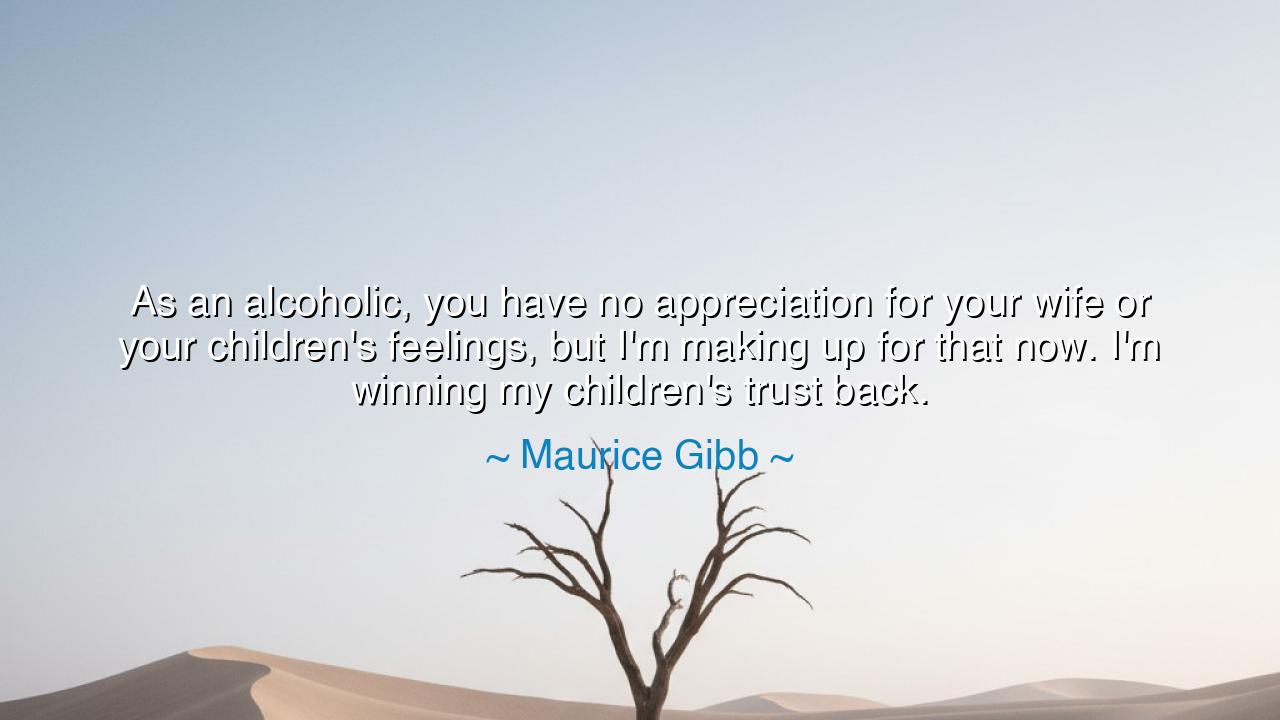
As an alcoholic, you have no appreciation for your wife or your
As an alcoholic, you have no appreciation for your wife or your children's feelings, but I'm making up for that now. I'm winning my children's trust back.






Hear the sorrowful yet redemptive confession of Maurice Gibb, a man who knew both the heights of fame and the shadows of weakness: “As an alcoholic, you have no appreciation for your wife or your children's feelings, but I'm making up for that now. I'm winning my children's trust back.” In this humble declaration lies a profound truth about human frailty, forgiveness, and the long road of reconciliation. It is the testimony of one who has stumbled into darkness, yet who chooses not to remain fallen, but to rise again and labor for healing.
The first part of his words unmasks the cruelty of addiction. For the one bound by alcohol—or any destructive force—life becomes consumed by self. The cries of a spouse, the tender needs of children, the sacred bonds of family, all fade into shadows behind the burning hunger of the habit. In this way, the addict does not merely harm himself; he wounds the hearts of those who love him most. Gibb admits this with painful honesty: the alcoholic has “no appreciation” for those feelings. It is not malice, but blindness—the blindness of bondage.
Yet in the second part of his words comes hope: “I’m making up for that now.” Here shines the truth that brokenness need not have the last word. The past may be stained, but the present can still be redeemed. To make up is not to erase, for wounds once made cannot simply vanish. Rather, it is to heal, to labor in love, to rebuild what was shattered. This is not quick work, but slow and sacred. It is the work of time, of humility, and of action that proves repentance.
The heart of his journey is captured in the phrase: “I’m winning my children’s trust back.” Trust, once lost, is not easily restored. It is like a fortress toppled in war—it must be rebuilt stone by stone. Each act of consistency, each word kept, each moment of sobriety, lays another block. It is not won in a day, nor by speech alone, but by steadfast living. In this, Gibb’s words echo an ancient truth: trust is not a gift that can be demanded; it is a treasure that must be earned.
History offers us echoes of this. Consider the tale of John Newton, once a slave trader who inflicted suffering on countless souls. Yet in his later years, having been broken and reborn, he sought to redeem his life through service, preaching, and song. From his repentance came the hymn “Amazing Grace,” sung by millions. Though he could never undo the pain he caused, he labored to win back trust by living faithfully, and his life bore witness that even the darkest sinner can find redemption.
The meaning of Gibb’s confession is both deeply personal and universal. Each one of us has, in some way, wounded those we love—whether through neglect, pride, anger, or weakness. And like him, we must face the truth that apology is not enough. True reconciliation requires winning back trust through action, patience, and humility. It is the slow art of proving that we have changed, and that our love is steadfast.
The lesson is clear: do not despair if you have fallen, nor think that bonds once broken can never be healed. Begin the work of restoration. If you are bound by addiction, seek freedom not only for yourself, but for those who love you. If you have wronged your family or friends, go beyond words—show them by your living that you are worthy of trust again. And if you are the one whose trust has been broken, remember that healing is possible, though it may take time and courage to allow it.
So I say to you, O children of tomorrow: remember Maurice Gibb’s words. Addiction blinds, but repentance restores. Trust, once lost, can be won again. Do not let your past sins bind your future. Rise, and walk the path of reconciliation. For though the work is long, it is holy. And in the end, the treasure of trust regained is greater than the sorrow of what was lost.






AAdministratorAdministrator
Welcome, honored guests. Please leave a comment, we will respond soon